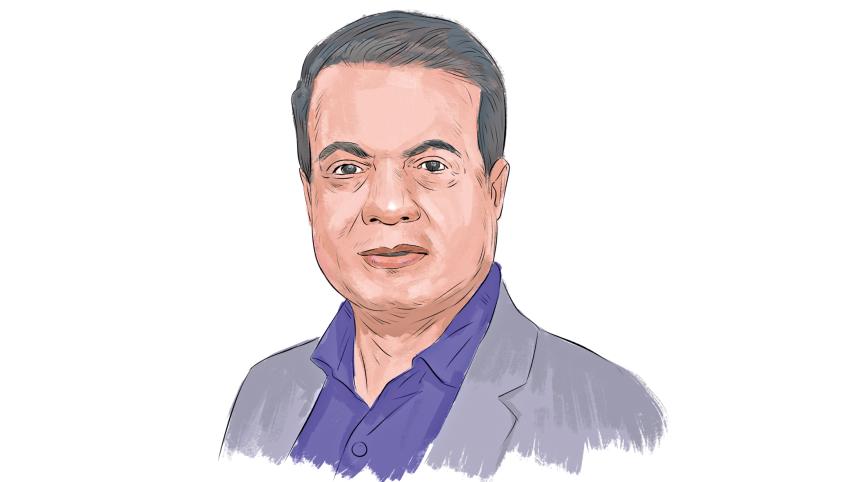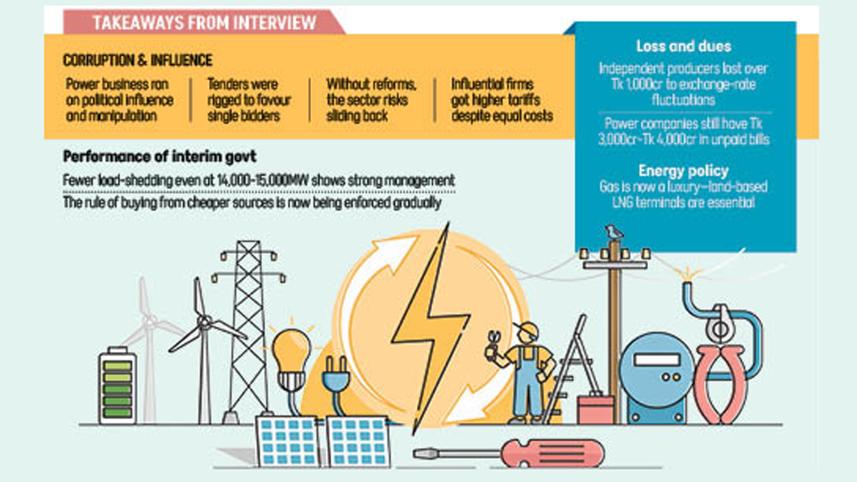Cronyism dominated power sector under Awami League

Bangladesh's power sector was long dominated by political influence, muscle power, and artificial crises designed to benefit a handful of companies during the deposed Awami League regime, said KM Rezaul Hasanat David, president of the Bangladesh Independent Power Producers' Association (BIPPA).
In a recent interview with The Daily Star, David said years of politically driven contracts and manipulated tenders had eroded fairness and efficiency in the industry. "Our industrialisation and foreign investment didn't grow because no one dares to invest big in an environment of corruption, bribery, and irregularities."
However, the situation has started to improve under the interim government, which has managed to maintain a stable power supply even with lower generation.

"How is it possible that there's no load-shedding at 14,000–15,000 megawatts of production? That's an indicator they're managing well," said the president of BIPPA, the main industry body representing private power generation companies in Bangladesh.
David, also the chairman and CEO of Viyellatex Group, which owns Midland Power Company Ltd, said he was "overall satisfied" with the Power Division's current performance.
For instance, he pointed out that before Ramadan, the government had been unable to pay the arrears of independent power producers (IPPs), and a shortfall of about 3,000MW was expected if at least 5,000MW of furnace oil-based power was not purchased from them. "But they took only 2,000MW and still managed," he said, crediting efficient management and favourable weather.
He added that, unlike before, the government is gradually enforcing the rules, including the one on merit order dispatch, which prioritises cheaper power sources. "My own plant, despite offering lower prices, never got full demand before. Now the government is purchasing up to 90 percent of our capacity."
David, however, noted that IPPs are still owed around Tk 3,000–4,000 crore, equivalent to six months of payments, and that currency depreciation has caused heavy losses.
"We incurred over Tk 1,000 crore in losses due to exchange rate fluctuations," he said, explaining that while IPPs have to use dollars to pay for many expenses such as fuel and machinery, the government reimburses them in taka.
Speaking on energy resources, David said gas, which was once a blessing, has now become a luxury as some vested groups have obstructed "both domestic gas exploration and land-based terminal projects to protect their floating storage and regasification unit (FSRU) business."
"We're supplying gas through FSRUs, which are temporary solutions like rental plants. Even that capacity is almost fully used," he said, stressing the need for land-based LNG terminals with large storage facilities.
"If gas prices were low, it would be possible for us to stock up. But now we're in a hand-to-mouth situation. We have to buy even when prices rise. We've been hearing about land-based terminals for eight years, but there's no progress," he added. "If the interim government could at least float tenders for a land-based LNG terminal, that would be meaningful."
David also pointed out that recent renewable energy tenders drew few serious investors because of "unrealistic" conditions and the absence of sovereign guarantees. "Those with experience know the projects won't move forward once a political government returns. Who will finance a $400–500 million project without guarantees? No bank will come forward," he said.
Nonetheless, he praised several of the interim government's policy steps, including the Merchant Power Policy, which allows industries to generate and sell their own power, calling it "a very practical idea if implemented properly."
The BIPPA president also welcomed the removal of restrictions on net metering, as it will inspire factories to generate their own power using rooftop solar. "It will reduce costs and fossil fuel usage."
He also spoke of outdated machinery in power transmission. The garment and textile factories still suffer from voltage fluctuations, often dropping to 170–180 volts instead of the standard 220. "The supply backbone is still stuck at 132kV lines. If the government had privatised transmission like generation, quality would have improved."
Alleging that the previous administration was unfair, he said, "Some sold power at higher rates, some lower. There was no uniformity in ensuring equal rates. The government often acted based on convenience, which hurt taxpayers."
Furthermore, he added, "Influential companies got higher tariffs despite similar costs of fuel and machinery. Even open tenders were manipulated. Sometimes two out of three bidders were disqualified on technical grounds to ensure a single winner."
He cited a case where one company won a tender for a power plant in Tongi at a higher price as the project was near Dhaka and land was costly. "But later, they applied to relocate the project to Noakhali. If Noakhali had been mentioned in the tender, others could have calculated land costs differently and bid accordingly."
"Such tricks were common in the power business," he added.
The BIPPA president welcomed the interim government's decision to review tariffs and contracts, saying those overcharging "should not only have their rates reduced but also be penalised." However, he added that the committees set up for this purpose have yet to take major action, possibly due to "a lack of political courage."
On the deal with India's Adani Power Plant, one of the major agreements under review, David said cancelling such a large international deal would be unrealistic. "If you cancel it, you have to pay billions in penalties, and we don't have the capacity to replace that much power."
He claimed, "The deal isn't too bad. The environmental risks are on the Indian side. They may adjust the coal prices, but not by much, because they know we have no alternative."
He also noted that a contract can be cancelled only if it is proven illegal or corruptly signed.
David also suggested that renewing contracts of older, efficient plants could be more economical than building new ones.
"Old plants have already finished capacity payments. If renewed, they will only need to pay for fuel and maintenance," he said, adding that efficiency doesn't necessarily drop after expiry. "The government can compare offers and choose the lowest-cost supplier."
Overall, the businessman said the situation in the sector has certainly improved, but the progress will last only if future administrations stay committed to transparency and reform.
"If a future political government undermines that, we'll go back to the old days," he warned. "Only sustained reform and fair competition can ensure industrial growth and investor confidence."




 For all latest news, follow The Daily Star's Google News channel.
For all latest news, follow The Daily Star's Google News channel.
Comments